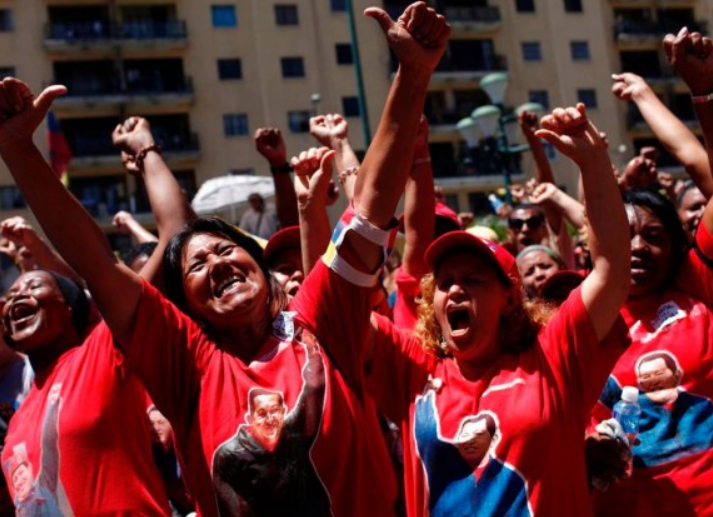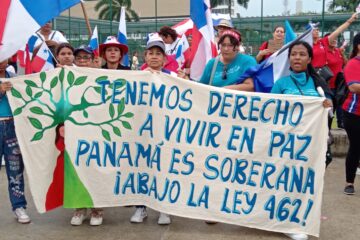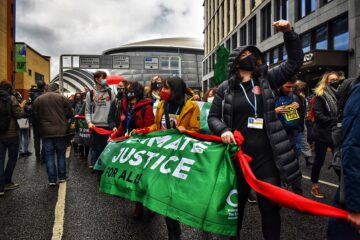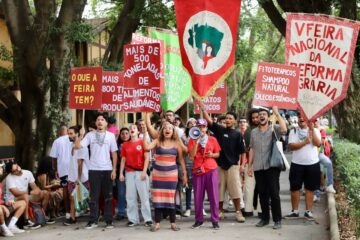After holding elections, Venezuela started to experience a violent atmosphere. Many militants from grassroots Chavismo have been attacked. Two feminist leaders spoke with the Argentina-based portal ARG Medios and Capire about these episodes and the work they have been carrying out on the ground, addressing the country’s political reality. Tamayba Lara is 33 years old and is an activist with the Communal Union of the Cultural Left-Wing Front (Unión Comunera del Frente Cultural de Izquierda) who has been a militant of the Bolivarian Revolution since she was 18. Alejandra Laprea, in turn, describes her activism as a nesting doll: she is an artist, filmmaker, art creator, communicator, and visual artist. She is part of the association Purple Ink (Tinta Violeta), which is part of the network of collectives Feminist Spider (La Araña Feminista) and the World March of Women, representing the Americas in its International Committee.
When mentioning the role of women in their territories, they argue it is a fundamental part of collective building: “we, women, play a very important role in all processes of grassroots building on the ground and in mobilizations, and this is also true in Venezuela. We are 70-80 percent of the spokespeople, community leaders, and political grassroots leaders of the United Socialist Party of Venezuela [Partido Socialista Unido de Venezuela—PSUV],” Tamayba says. Alejandra adds: “the face of this revolution is female, and it also has women’s hands, legs, and bodies in it.”
On June 29th, the National Electoral Council (CNE) declared Nicolás Maduro the winner of the presidential race to serve for a new term, with 5.15 million votes for him (51.2%) after 80 percent of the ballots had been counted. The major opposition candidate, Edmundo González Urrutia, received 4.45 million votes (44.2%), in a race in which 59 percent of the population voted, according to CNE. However, part of the opposition has not yet accepted their defeat at the ballot box and started an extremely violent undemocratic offensive.
According to Tamayba, this offensive happened in the territories, impacting the lives of women who are local leaders: “We’ve had cases of women who were killed in the latest elections due to the electoral conflict with the far right, a conflict that happened in many different ways,” she reports.
Meanwhile, Alejandra says that women have been “a powerful vote driver” and also a force “to raise awareness and spark reflection about why we vote and why we continue to support this revolution to ensure peace and a project of a socialist and feminist country.”
She also addresses the role of organized women to promote reflection and an analysis about movements in the current political scenario of offensives and counter-offensives. “We are trying to not only acknowledge this win, but also our strengths and weaknesses. We must continue to reaffirm ourselves, from our analyses and the creation of true awareness, as political subjects, and that we are not only aware of our oppressions, but also of our power to change them.”
While feminist militants have powerfully taken on the task of carrying out an election campaign and tackling everything that came afterwards, there is a feeling of exhaustion, “a feeling of sadness to experience again such an unfortunate and violent situation in which we are targeted by hate,” Alejandra says. Amid such a politically charged environment, she argues it is necessary to “assess how much responsibility we really have in all of this and what we can really resolve.” Both Tamayba and Alejandra address the issue of “overcoming existing resentment” to be able to continue to do the work and fix what is necessary. “The Bolivarian Revolution is not a perfect process,” they say, “but rather a process that can become perfect as we all join it.”
Fascist Rhetoric and Social Media
Operating under an imperialist and neoliberal logic, social media have played—and still play—a fundamental role in the ideological battles over Venezuela. In the current context, Elon Musk, the billionaire who owns X (previously Twitter), added fuel to fire as soon as the Venezuelan right started to report the alleged fraud. He wrote, among other things, that Maduro is a “dictator” and encouraged the violence that escalated on the streets of Caracas after the elections.
Alejandra says that comments on social media after the elections have posed great danger to women militants: “They have been harassed in their homes and experienced very painful things, including having their homes vandalized, leaders exposed, and many personal data about family members and loved ones exposed on social media,” she argued.
The two militants say there is something behind all that, shaping the opinion of international actors about Venezuela: “We are constantly portrayed on TV shows, movies, products that are supposedly just for entertainment, but deep down, we have always been portrayed as a rogue state, a corrupt state, a corrupt people,” Alejandra says. She adds: “All of a sudden we have become a matter of state for the Kingdom of Spain, a topic of discussion for the European Union. As this happens, there is always a way of seeing us.” And this becomes an even more complex topic as Venezuelan people migrate and are faced with xenophobia, racism, and colonialism when they arrive in different countries.
“Transnational interests are the same that oppress the people in Argentina and other places, and which aim to impose labels onto territories they consider to be disposable—‘this one can be maximally exploited’, ‘now, here I need a war to overthrow this economy’, ‘here we have a good opportunity to reactivate the arms industry’.” Tamayba, nevertheless, says that this has also been enabling a more structural conversation about social media, “with everything that has to do with data control, targeting, and these forms of mass manipulation by promoting targeted content.” For this reason, they recommend continuously looking for alternative sources that are committed to people’s aspirations and that empower the voices that advocate for sovereignty.
The two militants do not disregard the issues faced amid this scenario of coup attempts that must be overcome. They also argue that, in times like this, there must be an even more active militancy. As Tamayba says, we must wage “a battle for advances, for our well-being, for our dignity as a people, for the rights we have earned, for women’s power. All of these are struggles we must keep on building, developing, and leveraging at the national level, followed by our sisters and brothers at the international level, to stop the right from continuously cornering us and denying all the achievements of the Venezuelan people.” They add: “The road is rough, but it is ours—it is the path we have decided to pursue and, above all, the one that we, women in revolution, have chose to pursue.”




